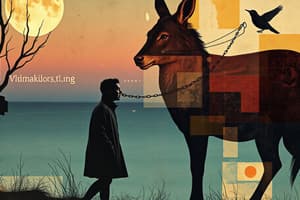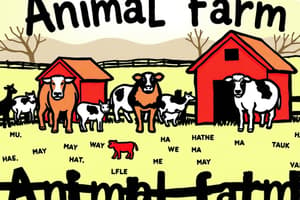Podcast
Questions and Answers
List three times when Wiesel or the guards use animal imagery to describe the men.
List three times when Wiesel or the guards use animal imagery to describe the men.
- Comparing Jews to beaten dogs, 2. Wiesel's father on all fours, 3. Idek described as a frog.
What evidence exists early in this chapter that the emaciated prisoners are actually stronger than their guards?
What evidence exists early in this chapter that the emaciated prisoners are actually stronger than their guards?
The SS Guards were under the order of shooting any who couldn't keep the pace.
What similarities do Akiba Drumer and Wiesel hold, and what's a crucial difference between them?
What similarities do Akiba Drumer and Wiesel hold, and what's a crucial difference between them?
Both enjoy Jewish mysticism and experienced a loss of faith; however, unlike Wiesel, Akiba got sent to the crematoria.
What's significant about Wiesel's choice to describe his father as 'bewildered, stunned, like an orphan'?
What's significant about Wiesel's choice to describe his father as 'bewildered, stunned, like an orphan'?
Explain how Rabbi Eliahu and his son can be seen as a parallel for the relationship between Wiesel and his father.
Explain how Rabbi Eliahu and his son can be seen as a parallel for the relationship between Wiesel and his father.
Describe the moment that reveals Wiesel is still a believer.
Describe the moment that reveals Wiesel is still a believer.
What is significant about Juliek playing a Beethoven concerto as he died?
What is significant about Juliek playing a Beethoven concerto as he died?
Write two lines from this chapter where it's clear that the prisoners set aside their own values in order to survive.
Write two lines from this chapter where it's clear that the prisoners set aside their own values in order to survive.
Flashcards are hidden until you start studying
Study Notes
Animal Imagery and Dehumanization
- Wiesel uses animal imagery to depict a sense of abject dehumanization among the inmates.
- Comparisons include Jews passing by as "beaten dogs" and Wiesel's father's fall described as being on "all fours."
- Idek is likened to a "frog," showcasing the low regard for humanity.
Strength in Emaciation
- Despite their weakened condition, the prisoners exhibit resilience.
- SS Guards are forced to execute those who cannot keep up with the grueling pace, highlighting the prisoners' survival instinct.
Similarities and Differences: Wiesel and Akiba Drumer
- Both Wiesel and Akiba Drumer share an interest in Jewish mysticism and a profound loss of faith.
- A critical distinction is that Drumer is sent to the crematories, while Wiesel's fate remains uncertain.
Simile of the "Orphan"
- The description of Wiesel's father as "bewildered, stunned, like an orphan" reflects Wiesel's emotional turmoil.
- The term "orphan" signifies Wiesel's deepening sense of isolation while caring for his father’s deteriorating state.
Parallel Relationships: Rabbi Eliahu and Wiesel
- Rabbi Eliahu's separation from his son mirrors Wiesel's fear of losing his own father.
- This parallel emphasizes the fragility of family bonds in the face of spiritual and physical hardship.
Faith Amid Anger
- Wiesel's ongoing conflict with God is evident, yet his actions suggest some remaining belief.
- Attendance at synagogue indicates that despite feelings of anger, he still seeks connection to his faith.
Juliek's Final Performance
- Juliek's decision to play a Beethoven concerto as he dies symbolizes a fleeting spark of hope in despair.
- It raises questions about whether the music was genuinely played for the dying men or a hallucination from Wiesel's perspective.
Survival and Moral Compromise
- The prisoners often reject their own moral values for survival, as seen in the lines "We were the masters of nature, the masters of the world," and "We were stronger than cold and hunger."
- These statements reflect a stark shift in priorities, underscoring the transformation of human values under extreme duress.
Studying That Suits You
Use AI to generate personalized quizzes and flashcards to suit your learning preferences.




